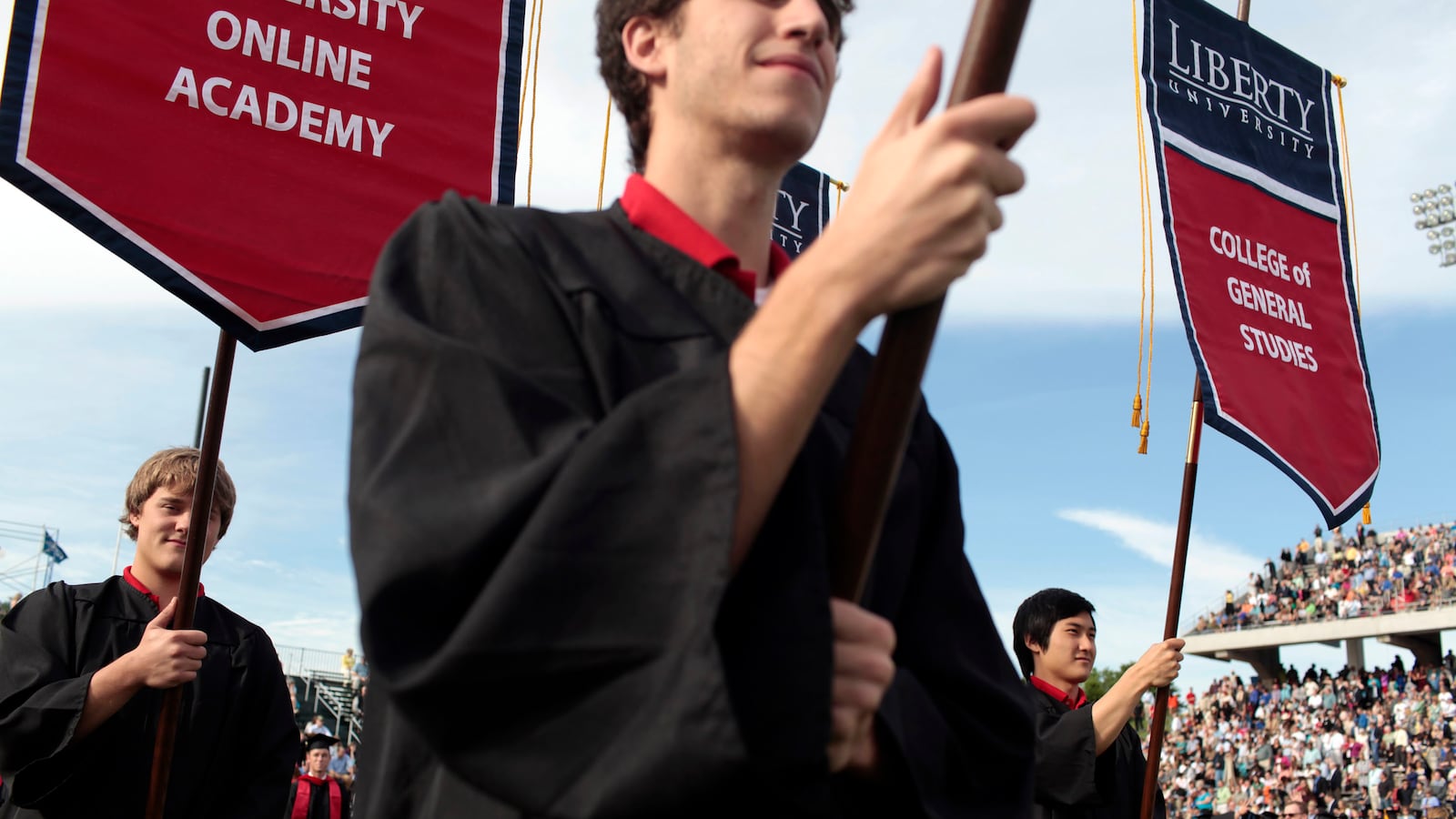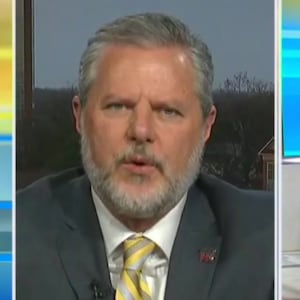When Liberty University President Jerry Falwell Jr. announced Monday that he was reopening the school’s residence halls to students amid the coronavirus pandemic, he implied that he had received the blessing of officials in Lynchburg, Virginia, to do so.
“They thanked us for making that decision,” Falwell told the Liberty University News Service, describing a call to move classes online but also, in his words, to get his students “back as soon as we can—the ones who want to come back.”
In fact, Lynchburg City Manager Bonnie Svrcek says that while she did thank Falwell for moving to online classrooms, she was led to believe that the school was also abandoning plans to invite students back into residence halls following spring break. Neither she nor Lynchburg Mayor Treney Tweedy said they signed off on Falwell’s decision to re-open Liberty’s dorms.
On Tuesday, Svrcek told The Daily Beast that Falwell was not “totally transparent” with her or Tweedy during an exchange on March 16 in which, according to Svrcek, Falwell told the two leaders that his school would “move to an online platform.”
“He added that some food services would remain open for on-campus international students who have not gone home and some lab classes and the school of aviation will continue,” Svrcek told The Daily Beast. “The mayor and I thanked him for this shift that we believed meant that students would be told to not come back to campus with a few exceptions.”
That Falwell chose to go forward without the blessing of the city officials wasn’t surprising. He is perhaps Donald Trump’s most unapologetic ally in evangelical Christian circles, and the president himself is eager for schools, businesses, and public establishments to reopen and get the country past its coronavirus-induced economic slump.
But for some students at Liberty, the notion that they will now be coming back from various parts of the country to mix and mingle in one shared campus was less than appealing, and yet another sign that their college president was putting loyalty to Trump over other considerations.
“It seems like [Falwell] wants everything to be open pretty quickly, following Trump. I saw this morning that [Trump] wants businesses to reopen,” said one Liberty senior, who asked to remain anonymous due to fears of retaliation by Liberty administrators. “Jerry literally follows anything that Trump says.”
Falwell has consistently downplayed the severity of the coronavirus crisis, even suggesting that nationwide efforts to control its spread represent a plot to undermine the Trump presidency. Last week, however, he did move the school to online classes while keeping it open for students who wished to return to campus or who, in the cases of some international students, simply had nowhere else to go.
Svrcek said that she had implored Falwell to keep students away until the public-health crisis abated. And, initially, it looked like the school would stay open but would encourage students not to return. “While students are currently allowed to return to live in the residence halls, we are encouraging you to consider staying home,” Liberty’s Office of Residential Life wrote in a March 17 campus-wide email.
But three days later, the office walked back that pronouncement. “The intent of encouraging students to consider remaining at home was to simply advise students to think carefully about their choice and discuss the matter with their parents,” the school wrote, according to the emails, which were obtained by The Daily Beast. “It was not an endorsement or recommendation of that particular course of action.”
It’s that vagueness toward the threat posed by the coronavirus that has some students frustrated and concerned. “It’s the constant overemphasis of the effectiveness of the university’s mitigation measures and a constant downplaying of the dangers posed by this virus,” said Liberty senior Calum Best in an interview with The Daily Beast. “I don’t envy [Falwell’s] decision, it’s a tough one to make and ultimately he’s going to be criticized no matter what he does. But he can work through that decision without being misleading.”
Liberty’s plan currently is to reopen the school’s dormitories to incoming students, but classes and other campus gatherings will be held online or canceled altogether. Nonetheless, experts told The Daily Beast that clustering students in on-campus housing poses extreme and unnecessary risks and will almost surely lead to more cases of the virus among the student body.
“If Liberty University reopens, people will die,” said Max Cooper, an emergency-room doctor at Crozer-Chester Medical Center in Pennsylvania who served in the U.S. Navy and is now leading his area’s Emergency COVID-19 Task Force. “To say nothing of the many educators and university support staff whose age and mortality likely skews older and higher. It’s imperative that Liberty and other universities stay closed.”
Lawrence Gostin, who directs the O’Neill Institute for National and Global Health Law at Georgetown University and the World Health Organization’s Collaborating Center on National and Global Health Law, called Liberty’s decision to reopen “utterly irresponsible.”
Some faculty at Liberty, which just last year received a federal research grant from the National Institutes of Health, have gone further than to downplay the dangers of the virus. One professor even suggested that students disregard state government measures designed to limit the virus’ spread.
“There is no evidence that quarantine works, just ask Italy or Spain right now about that,” Liberty University history professor Benjamin Esswein told his class Tuesday morning, according to a copy of digital classroom chat logs obtained by The Daily Beast. The statement came in response to a student who said she wouldn’t be able to complete an assignment requiring her to visit a museum due to the mandated closure of non-essential businesses in both Virginia and her home state. “We’re not even supposed to leave our houses,” she said.
Asked whether students could “visit” a virtual museum to satisfy the requirement, Esswein denied the request. “Be safe about it, but remaining active is the best way to fight off the virus, you should try to go to a park or other area that might have a free-standing exhibit,” Esswein told his class. “You should leave your house, it’s unhealthy to stay inside for the rest of the semester.”
Esswein did not return a request for comment. But shown a copy of that exchange, Gostin scoffed. The “discussion just isn't fact-based,” he said. “Quarantines do work and for every student that is infected, he or she will infect two others, and so forth. The rise in cases could be exponential.”
That’s to say nothing of the faculty and staff who could be exposed to the virus and then return to their off-campus homes, potentially exposing individuals who never even set foot on campus, noted Adrian Hyzler, the chief medical officer for Healix International, which provides medical information to organizations whose clients travel internationally. Hyzler called Falwell’s decision to reopen the school “nuts.”
“We have seen how gatherings to people at conventions, prisons, religious meetings, and teaching facilities can be breeding grounds for transmission and this could well become another of those epicenters,” said Hyzler.









